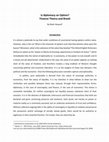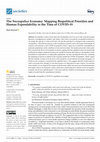Papers by Mark R S Howard

Politics, 2024
The challenges and opportunities of accessing empirical material present a puzzle insofar as they... more The challenges and opportunities of accessing empirical material present a puzzle insofar as they index simultaneously the politics of research archives and the positionality of researchers. Today, amid increasing authoritarianism, disinformation, and the obstacles created by the securitisation and privatisation of data, access to reliable information is frequently blocked or complicated by the interests of political management, corporate monopoly, and surveillance capitalism, as well as by institutional and personal constraints on researchers. At the same time, digital archives, social media, blogs, diverse global communications, and even the information management tools of authoritarian and corporate control, create innumerable alternative access points for research. In this article, we describe all of these other access points as 'alternative archives', and, in doing so, we also seek to highlight three overlapping definitions of their alternative status in terms of (1) empirical, (2) counter-hegemonic, and (3) epistemic meanings. We next provide five state-of-the-art examples of overcoming research obstacles due to state-of-the-world developments in surveillance capitalism, securitisation, authoritarianism, information control, and human insecurity, suggesting that we can learn from obstacles to research as well as the alternatives.

Finance and Society, 2024
This article explores venture capital (VC) as a means and process of accumulating future social n... more This article explores venture capital (VC) as a means and process of accumulating future social necessity. It explores the mechanisms of growth that make VC-backed firms distinct. I argue that a distinctive feature of surplus value capture through VC is valorization via socially necessary contracted space-time, a corrective to Marx's theorization of socially necessary labor time, which appears incomplete in the context of VC. First, extending Marx's general formula for capital, I develop a general formula for VC, demonstrating how the VC investment upends traditional theories of capitalist accumulation. Second, I argue that VC invests in firms seeking to capture 'human capital' resources and uncapitalized market 'space' (noncapitalist social logics of exchange) with the aim of achieving 'product-market fit'. Third, I demonstrate how time and space are contracted under the VC process as a value capture (VC) mechanism relating to future social necessity. VC is, I argue, about accumulating today what we will all need to be consuming tomorrow, just to keep up with social norms. Finally, I explore how the valorization of crisis (VC) demonstrates the accumulation of future social necessity in practice. I conclude with thoughts concerning the possibility of alternatives beyond the overdetermined rapacity of 'VC'.
Review of Radical Political Economics, 2023

In finance, experts have spent decades developing complex investment instruments known as Options... more In finance, experts have spent decades developing complex investment instruments known as Options to minimize the risk taken by investors speculating on the market. Options are highly mathematical, which suits the quantitative field of Financial Economics. However, many aspects of Options are grounded in inter-temporal philosophical concepts suitable for qualitative fields of study, including international strategy and diplomacy. This paper argues that Options Theory provides ready-made models and concepts for diplomacy in rapidly changing contexts, but has as yet been under-exploited in the field of international relations. Drawing on the work of Elie Ayache and Robert Meister, I argue that an international political Options theory is not only possible but already exists. I demonstrate this claim by applying Options Theory to anticipated negotiations and strategic realignments that the United Kingdom is engaging in as the reality of Brexit approaches its denouement amidst a disinte...

Societies, 2021
Necropolitics centers on the dark side of biopolitics, but if we are to take seriously Jacques Ra... more Necropolitics centers on the dark side of biopolitics, but if we are to take seriously Jacques Ranciere’s reassignment of ‘politics’ and ‘police,’ then what is revealed by necropolitical analysis is not simply the capacity to ‘make and let die’, but also the policing of a contingent order sustained by necropolitics. I describe this process as the necropolice-economy, and in this paper demonstrate its contours with reference to the COVID-19 pandemic which, I argue, has revealed the expendability of particular populations under conditions of risk and uncertainty. My analysis proceeds in three parts. First, I present the thesis of necropolice economy, arguing that the capitalist system has historically produced not simply a political economy, but a policed economy that induces a necropolitics of dispensability for unproductive or replaceable populations. Second, I develop this thesis by examining the relegation of society in relation to the economy amidst the COVID-19 pandemic. Third, ...

Societies, 2022
Necropolitics centers on the dark side of biopolitics, but if we are to take seriously Jacques Ra... more Necropolitics centers on the dark side of biopolitics, but if we are to take seriously Jacques Ranciere’s reassignment of ‘politics’ and ‘police,’ then what is revealed by necropolitical analysis is not simply the capacity to ‘make and let die’, but also the policing of a contingent order sustained by necropolitics. I describe this process as the necropolice-economy, and in this paper demonstrate its contours with reference to the COVID-19 pandemic which, I argue, has revealed the expendability of particular populations under conditions of risk and uncertainty. My analysis proceeds in three parts. First, I present the thesis of necropolice economy, arguing that the capitalist system has historically produced not simply a political economy, but a policed economy that induces a necropolitics of dis- pensability for unproductive or replaceable populations. Second, I develop this thesis by examining the relegation of society in relation to the economy amidst the COVID-19 pandemic. Third, I argue that the inability of states to be decisive in the pandemic reveals that the sovereign prerogative to decide on the exception is constrained by capitalist forces. This suggests that the world market is itself a sovereign force, though it is one that remains ever dependent on state violence. To conclude, I ask whether we can channel the trauma of death made visible into processes of memorialization that might catalyze revolutionary action, rather than accelerating the evolution of our necropolice economy into its next capitalist guise—I ask, provocatively, whether an emancipatory necropolitics might yet result from the contemporary moment.

Caustic Frolic, 2019
This paper argues that what it means to be in the midst of a world-historical moment, is to be in... more This paper argues that what it means to be in the midst of a world-historical moment, is to be in a state of anticipation concerning the end of history conceived of as the achievement of justice. It means, on the one hand, to be at a conjuncture that offers the possibility of justice, and, on the other, to be in a state of uncertainty as to its ultimate fulfillment. I proceed by, first, examining the doctrine of the end of history, arguing that world-historical events always appear as a promise to end history, but have to date only punctuated it. Each world-historical event opens up a historical horizon constituting a new world-historical moment, and therefore a new promise for justice and the end of history. Second, I examine the modes of signification by which we attempt to reveal, or have revealed to us, truths about human existence that suggest a path to the end of history. Third, I explore the various ways in which human beings are subjectivated by world-history, along with the varieties of angst and uncertainty that each world-historical moment brings. I conclude with a summation, and some speculative offerings as to the possibility of justice on our horizon.
Teaching Documents by Mark R S Howard
Drafts by Mark R S Howard

In the world of finance, experts have spent decades developing complex investment instruments kno... more In the world of finance, experts have spent decades developing complex investment instruments known as Options in order to minimize the scope and impact of risk taken by investors speculating on the market. Such models are highly technical and mathematical in character, which is aptly suited to a quantitative field of Financial Economics. However, many aspects of Options, including their core underlying assumptions, are grounded in inter-temporal philosophical concepts that are analogous to, and suitable for application in, qualitative fields of study, including international strategy and diplomatic relations. This paper argues that Options Theory provides a ready-made set of models and concepts that could be adapted for diplomatic negotiations and strategies in rapidly changing contexts, but that has as yet been under-exploited in the field of international relations and political theory in general. Drawing on the work of Elie Ayache and Robert Meister, I argue that an international political Options theory is not only possible but already exists. I will demonstrate this claim by applying some core tenets of Options Theory to the anticipated negotiations and strategic realignments that the United Kingdom is and will be engaging in as the reality of Brexit approaches its denouement amidst a disintegrating Western Liberal Democratic alliance.










Uploads
Papers by Mark R S Howard
Teaching Documents by Mark R S Howard
Drafts by Mark R S Howard